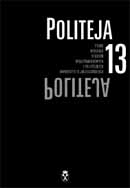Serbowie a kwestia międzynarodowego uznania dyplomatycznego Republiki Kosowa w lutym i na przestrzeni 2008 roku. Studium problemu
The Serbs and the issue of international diplomatic recognition of Republic of Kosovo in February and in the course of 2008. The study of the problem
Author(s): Dariusz WybranowskiSubject(s): Politics / Political Sciences
Published by: KSIĘGARNIA AKADEMICKA Sp. z o.o.
Summary/Abstract: This article is an attempt to present a generally understood opinion of the Serbs and their various groups, both in Serbia itself and scattered all over the world, about the unilateral Albanian proclamation of independence of Kosovo on 17 February 2008. The author thoroughly examines the Serbian government’s official standpoint, the individual politicians’ opinions as well as positions of the main political parties, the Orthodox Church, numerous organisations, associations, representatives of academic and media circles, etc. The analysis ends with the beginning of December 2008 when Kosovo’s independence was recognised by 54 countries all over the world. The major thread of this paper, i.e. very strong Serbs’ opposition against the aforementioned proclamation of February 17 has been shown against the background of Serbian -Albanian relationship on the turn of the 20th and 21st century with particular emphasis on the years of 2007 -2008. Another factor that the author presents is a vast description of the process of gradual acceptance of Kosovo’s independence by more and more countries and their political and economic motivations in view of legal and political actions undertaken by Belgrade in order to question the legality of the secession act. Moreover, the author undertakes an effort to analyse the results of the political polarisation of the world, the political motivations of the superpowers to support Kosovo’s autonomy as well as the mechanisms of establishing coalitions of the opposing states and the role of Serbian diplomacy in this matter. He also presents the official position of not only the individual governments but also of the world’s major religious communities (including the Catholic Church, the Orthodox Church and the world of Islam), of key international organisations and military alliances as well as of „non -recognised” countries and political secession movements. The question of Kosovo has been one of the most complex problems of the European politics and the factor that noticeably divided the European Union states. Kosovo’s proclamation of independence and the Serbian opposition against it revealed one more area of competition among the world’s superpowers – with, on one side, Russia, China, India, the part of Muslim world and some countries in Africa, Latin America and Oceania supporting the Serbs and, on the other side, the United States, the majority of the EU states (including Poland) and other countries who, for various reasons, decided to support the Western policy of encouragement for Albanian efforts and initiatives promoting Kosovo’s independence.
Journal: Politeja - Pismo Wydziału Studiów Międzynarodowych i Politycznych Uniwersytetu Jagiellońskiego
- Issue Year: 7/2010
- Issue No: 13
- Page Range: 417-454
- Page Count: 38
- Language: Polish

